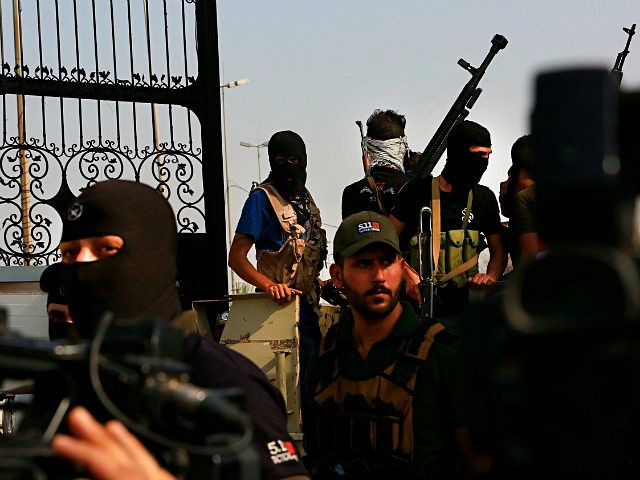Iraq has reappointed the former chief of the Iranian-backed Popular Mobilization Forces (PMF) to his dual posts as chairman of the Shiite militias and national security adviser to the prime minister, the Associated Press (AP) reported Tuesday, noting that the Tehran-allied militiaman has also been nominated to head the country’s powerful interior ministry.
AP revealed:
Falih al-Fayadh retook his seat at a meeting of Iraq’s National Security Council on Sunday after he was sacked from his positions by caretaker prime minister Haidar al-Abadi in August for political behavior. …Al-Fayadh has also been nominated to head the country’s powerful Interior Ministry, which has been under the control of ministers close to Iran since 2010. His nomination has been opposed by the political bloc of populist Shiite cleric Moqtada al-Sadr, which says it wants to limit outside influence in Iraqi politics.
AP’s revelation is a testament to Iran’s growing influence in Iraq, which U.S. President Donald Trump’s administration has vowed to curtail.
The PMF — also known as the Popular Mobilization Units (PMU) and Hashd al-Shaabi — is an umbrella organization for an assortment of mostly Shiite militias backed by Iran that is considered by the United States as one of the biggest Tehran-linked threats to security in the Middle East.
Although the U.S. government considers the PMF to be a threat to American interests and the Middle East, a Pentagon spokesman recently suggested to Breitbart News that fighting the Iran-allied Shiite militias is not part of the U.S. military’s mission in Iraq, insisting that America’s goal is the enduring defeat of the Islamic State (ISIS/ISIL).
The U.S. military has praised the PMF for its contribution to the devastating losses ISIS has sustained in Iraq, but Reuters reported last week that the American service members and the Shiite fighters are facing each other in a “wild west situation” along the Iraq-Syria border now that the fight against the jihadi group is mainly over.
Reuters revealed:
The PMF has been deploying in growing numbers at the border, fearing hundreds of Islamic State militants who fled Iraq are trying to cross back into Iraqi territory. The deployment is strengthening the PMF’s de facto control over large stretches of the frontier while its leaders are calling for a formal, permanent role securing the border. But with fewer Sunni militants to contend with on the Iraqi side a year after Baghdad declared victory over IS, many Shi’ite paramilitaries now see the United States as a bigger threat. …As the battle against a mutual foe rumbles on, Washington and Tehran are keeping a close eye on each other in this part of the region, raising the risk of new violence.
Baghdad has legalized the PMF as a component of Iraq’s military and the U.S. military has expressed support for the integration. However, the U.S. military has also acknowledged that not all PMF factions are under the control of Baghdad.
Speaking on condition of anonymity, an American official told Reuters “outright” aggression was not expected by Shiite militias before the U.S.-led coalition and local forces decimated ISIS’s territorial caliphate.
“The question is what are they going to do once things are done,” the official proclaimed.
“The danger is always there [and] the Americans clearly don’t have the forces to handle that. We only have a couple of thousand guys in the area. If the militias want to turn on the problems, they can. It’s a Wild West situation,” Philip Smyth, an analyst at the Washington Institute for Near East Policy, told Reuters.
The PMF is estimated to have up to 150,000 fighters in Iraq, including 20,000 deployed near the town of Al-Qaim along the Iraq-Syria border where the risk of confrontation between Shiite militiamen and U.S. troops is substantial.
Currently, there are an estimated 5,200 U.S. troops serving in Iraq.
Despite repeated requests by Breitbart News, the Pentagon has refused to reconcile its support for the Iran-backed PMF in Iraq with its stated goal of degrading the Tehran-allied militia presence and influence in neighboring Syria.
The Pentagon insists that it only provides support to PMF fighters vetted for links to the government of Iran and terrorist groups, as mandated by U.S. law.
U.S. troops are currently “helping to develop the Iraqi Security Forces,” which includes the PMF, “to train and equip themselves, building resilience in security and sustainment capabilities, including the growing air enterprise, intelligence, and counter-terrorism,” Cmdr. Sean Robertson, a Pentagon spokesman, told Breitbart News in late November.
Not all PMF fighters maintain links to Iran. The umbrella organization also includes Sunni, Kurdish, and even Christian forces.
In September, Iran-allied militias attacked the American diplomatic consulate in Basra and the embassy in Baghdad.
PMF factions — namely Kata’ib Hezbollah (KH) and Asa’ib Ahl al-Haq (AAH) — have repeatedly made threats against the U.S. military during the anti-ISIS operations.
The Institute for the Study of War linked AAH to more than 6,000 attacks against U.S. troops between 2006 and 2011.
Last month, American lawmakers finalized a bill to sanction the AAH and Hezbollah wings of the PMU.
The Pentagon inspector general recently reported that the threat against U.S. troops in Iraq posed by Iranian proxies like the PMU has intensified.

COMMENTS
Please let us know if you're having issues with commenting.